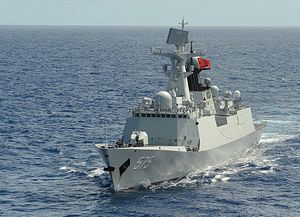A few weeks ago, I discussed China’s aspirations to burnish its anti-piracy credentials by responding forcefully to the new resurgence in piracy off the Horn of Africa.
In at least two incidents in April, Chinese People’s Liberation Army-Navy vessels, assisted by the Indian Navy in at least one of the two instances, acted as first responders. In the first incident, Chinese forces rescued the crew of a Tuvalu-flagged bulk carrier, the OS 35, and in the second, the PLAN responded to a distressed Panamanian-flagged carrier, the Alheera. With reference to the latter, Voice of America reported that unidentified “foreign naval forces” used lethal force against the pirates.
The Chinese government has yet to confirm if its naval forces used lethal force against pirates in the Indian Ocean, which may well be the PLAN’s first recorded use of such force in the Indian Ocean region. The matter of anti-piracy did come up at the Chinese Ministry of Defense’s monthly press conference in April. Senior Colonel Yang Yujun, spokesman for the Ministry of National Defense, was clearly pleased when the matter of China’s anti-piracy activities came up, commending the reporter that raised the question for a “very good question.”
He went on to note the “strong rebound of piracy activities has been witnessed with a large increase of attack in the Gulf of Aden and waters off Somalia” this year. He then confirmed the activities of PLAN vessels in anti-piracy activities that had been earlier reported on by Chinese state media. “On April 9, the Chinese guided missile frigate Yulin rescued a Tuvaluan cargo ship hijacked by pirates and ensured the safety of the 19 crew members.”
He then described the circumstances of the second incident, where the PLAN may have used lethal force. “On April 15, the Chinese guided missile frigate Hengyang verified and expelled pirate suspects and successfully rescued a Panamanian ship,” he said. Yang did not clarify if lethal force was used, simply noting that the pirates had been “expelled.”
Crucially, supporting the argument I’d made earlier that China views these anti-piracy coups as an important justification for the PLAN’s increasingly expeditionary presence in the western Indian Ocean region, Yang noted that “the pirate threats in the Gulf of Aden and waters off Somalia can not be eliminated in a short term, thus the escort mission will be a long term task for the Chinese PLA Navy.”
Casting China as a defender of the global commons in a manner similar to the United States Navy, Yang continued: “The Chinese side will keep a constant deployment and make more contribution to maintain regional peace and stability, and secure the security of important Sea Lines Of Communication (SLOCs).”
As Beijing establishes its first overseas naval facility in Djibouti, the PLAN will no doubt continue to seek out anti-piracy missions to justify its presence in the region as a benign contributor to the security of the global commons. In this endeavor, it will seek to rebuff skepticism among U.S. and Indian observers that the PLAN’s westward expansion in the Indian Ocean is more about securing a strategic advantage in any future inter-state conflict.

































